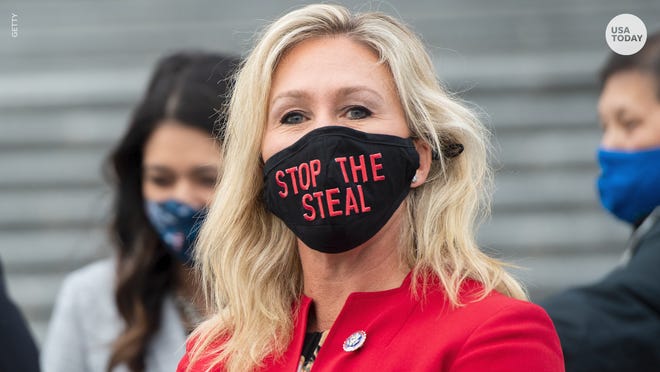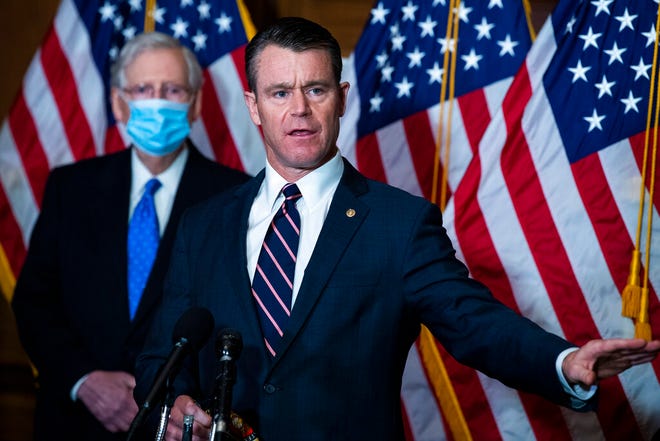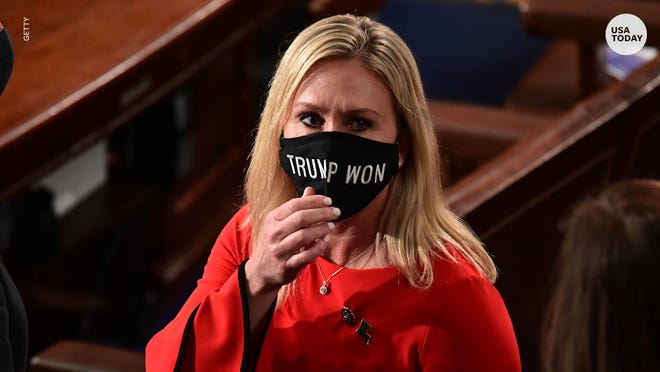Briggs: GOP establishment can’t kick QAnon out of party after years of benefiting from it
This must have felt liberating, perhaps even cleansing, for Sen. Todd Young. There was no caution. No hesitancy. Just straight fire.
“There should be no debate about Marjorie Taylor Greene,” Young said Tuesday during a call with journalists. “She’s nutty. She’s an embarrassment to our party. There’s no place for her in the Republican Party — there ought to be no place.”
There also ought to be no ambiguity on how Young feels about Greene, not after those remarks. He is not alone — indeed, he spoke out after Senate Minority Leader Mitch McConnell made similar comments describing Greene’s “loony lies” as a “cancer” on the Republican Party.

Greene is a newly sworn-in representative from Georgia who has nurtured support for the conspiracy cult QAnon, a widespread and twisted belief system that places former president Donald Trump at the center of a battle to stop a satanic cabal of deep-state, pedophile elites.
Greene’s background was well known even when she ran for office last year, but she has faced increasing scrutiny as journalists have uncovered additional disturbing social media activity from 2018 and 2019 in which she endorsed executing prominent Democrats. She has previously claimed no plane crashed into the Pentagon on 9/11 and that mass shootings in schools did not happen.
It’s easy to see why Republican Party establishment figures including Young and McConnell want to cast out Greene from the GOP mainstream. But it’s not their call anymore. Their time to define the Republican Party passed by them in recent years while they stayed mostly silent for the sake of keeping the party together, passing tax cuts and confirming judges.

That became clear Wednesday when Greene reportedly received a standing ovation from half of the House Republican caucus and even clearer on Thursday when only 11 House Republicans joined Democrats in voting to remove Greene from her committees. Greene in a floor speech offered assurances that amounted to confirming the sky is blue, such as telling her colleagues that “9/11 absolutely happened.” Greene also claimed to have stopped believing in QAnon, saying, “when I started finding misinformation, lies, things that were not true in these QAnon posts, I stopped believing it.”
That was all Greene’s fellow House Republicans needed to hear in order to embrace her.
Now, flash back to Young two days earlier. He’s talking about the future of the Republican party as if Greene is a sideshow, a distraction, rather than what she is — an animating force that has every bit as much of a stake in the party as Young does.
“She’s not even part of the conversation as far as I’m concerned,” Young said. “But there is a question about whether our party is going to be a party that is grounded in resentment and anxiety and fear or, if instead, we’re going to be an aspirational party that is dedicated towards addressing the convergence of globalization in the fourth technological revolution and urbanization and the lack of agency and control over one’s lives that those different forces have imposed upon certain segments of our population.
“That’s what we need to be wrestling with right now — and the hollowing out of certain communities on account of these forces. So government at the federal level has an important role to play. I believe in institutions. That’s why I characterize myself as a conservative, because I believe in institutions and institutions, including government, need to work.”

That is an inspiring vision for the Republican Party and everyone should be rooting for Young to see it through. But it also suggests Young is in denial about the state of the party today, overconfident in his power to repair and protect it and blind to how much damage occurred during the past five years in which he lacked the clarity he has summoned to speak out against Greene.
If you believe Carl Bernstein’s reporting from November — and I do — then Young is among more than 20 Republican senators who felt “extreme contempt” for Trump and were glad he lost the presidential election. It would not be a stretch to imagine Young leveling his words about Greene — “nutty” and “an embarrassment to our party” — toward Trump.
Trump might not have explicitly embraced QAnon in the same way that Greene did, but his political career is bookended by insidious conspiracy theories: He built the foundation of his run for president on birtherism, the false and racist claim that Barack Obama was not born in America, and attempted to sustain it on the democracy-destabilizing lie that President Joe Biden stole the election from him. In between, Trump made similar voter fraud claims when Texas Sen. Ted Cruz won the Iowa Caucuses in 2016; he claimed Cruz’s father was involved in the assassination of John F. Kennedy; and he suggested MSNBC host Joe Scarborough murdered an employee when he served in Congress.
It is one thing for Young to call out an extremist when that person is a powerless freshman congresswoman from Georgia. It is apparently trickier when the extremist happens to be a rich, attention-grabbing celebrity who becomes president and holds the Republican base in his hands. Indeed, the party evolved on Trump himself. Republicans blistered the former reality television host with criticism before he became president and then muzzled themselves once he took office.
Trump and his conspiracy theories sat at the head of the Republican Party table for years, leaving no leeway for sincere, well-intentioned — yet formerly quiet — Republicans to assert now that Greene is unfit to have a seat.
A reporter asked Young if he is worried about facing a Republican primary challenger when he faces re-election in 2022 — a legitimate possibility given how the tide is turning against pragmatic conservatives.
“I’ve got a pretty low pulse. You know, I really don’t worry,” Young said. “I didn’t worry when Evan (Bayh) entered my race (in 2016). I got a lot of fallback options. So, you know, unlike some career politicians who are wedded to their titles and in their positions, I got a good life.”
I believe Young when he says he has plenty of options and doesn’t need a career in politics. I am less convinced that he doesn’t worry.
Young’s comments about Greene likely reflect his sincere beliefs about the Republican Party and what it should stand for. It’s fair to wonder then whether Young had similar thoughts about Trump and, if so, why he didn’t say anything. That choice suggests a lack of confidence behind Young’s assertion that Greene represents an irrelevant fringe in an otherwise strong institution.
For anyone who cares about conservative governance, this is a time to worry. The Republican Party might not be big enough for both Young and Greene, but it is not yet clear which one of them must go.
Contact IndyStar metro columnist James Briggs at 317-444-6307. Follow him on Twitter: @JamesEBriggs.
*** This article has been archived for your research. The original version from IndyStar can be found here ***


